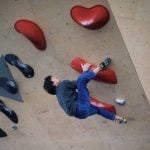
Just like a skilled artist needs a good canvas, a quality climbing gym needs high-quality climbing walls. But making high-quality walls is easier said than sent. Proper walls need to be durable, functional, aesthetically pleasing, and they need to fit the needs and goals of the climbing center. When building a new climbing gym, aspiring owners have to answer one very important question: “Who is going to build our walls?”
Enter Citywall—a long-experienced, global wall producer out of Slovenia. Citywall’s focus on sustainable materials, a bespoke design process, and fast turnaround times makes them a strong choice for new gym builds and existing gym build-outs alike. This year, Citywall has made its entrance into the North American market, positioning themselves as a unique combination of global experience and small company feel.
Citywall – Every Project Is Personal
Citywall may be a new player in North America, but they’ve been designing and installing walls for nearly three decades. Since their founding in 1996, Citywall has installed walls in 20 countries, spanning four continents. In 2021 and 2022 alone, Citywall manufactured and installed 75 projects in 14 different countries, totaling over 450,000 square feet of climbing surface. Their versatility shows up in the different projects they undertake—from your typical wide-ranging commercial climbing centers to boutique school walls, training-focused facilities, outdoor bouldering areas, and self-standing towers.

To understand what sets Citywall apart is to take a mental trip to Slovenia. Historically, the Slovenes were a people who settled in the jagged peaks of the southeastern Alps. Today, in the climbing world, the country is a top-tier climbing destination that produces athletes who are consistently seen on the World Cup and Olympic circuits. When it comes to business, Slovenian culture is known for its strong work ethic and drive. Citywall is the product of that mountain culture and hard-work mindset—a company that aims to produce world-class, sustainable walls with professionalism and within tight deadlines.
The Product – Quality, Sustainability and Durability
There is much more that goes into designing and building a climbing wall than meets the average climber’s eye. Climbing walls must sustain heavy weight and force loads as well as constant resetting of routes, demanding strong structure and longevity. And durability is a function of materials and design.
Citywall finds that durability in their structural material of choice: glulam. Glulam is glued laminated timber—a structural material composed of layers of lumber glued together with moisture-free adhesives. Glulam has both a strong strength-to-weight ratio and a higher resistance to lateral buckling than steel. It is a natural, sustainable structural alternative, and it requires one sixth of the production energy that comparable strength steel requires—an aspect that is appealing to both gym owners and gym customers. “At a time when we are all suffering from a lack of raw materials and the consequences of the climate crisis, the choice of building material is of course of crucial importance,” says Sebastian Oppelt, who co-runs Boulderwelt, a gym brand in Germany which has built seven locations and counting with Citywall. “Most of our customers have also developed a great awareness of this. Wood is a renewable raw material that also contributes to a good indoor climate and is therefore ideal for our project.”

Because glulam is glued together rather than harvested as large beams from a single tree, the sourcing options are not limited to large trees from old growth forests. This factor also assists in transportation and construction, making the structures much easier to move and assemble. “We can fit 40% more materials in a shipping container if using engineered wood substructure,” says Kynan Waggoner, Managing Director for Citywall North America. “We can install 40% faster if using an engineered wood substructure. These savings are the client’s savings.” And on the installation side of things, glulam is easier to work with. “It is much easier for our installers to make ‘on-the-fly’ adjustments to the substructure that come with every climbing gym build. It is much more difficult to engineer and fabricate something on the spot when using steel as your substructure.”
Combine the glulam with Baltic birch, sourced from productive forests throughout Europe, and the whole package is sustainable, cost effective, and highly aesthetic. “This was one of the major reasons for choosing Citywall for our concept building in massive wood,” says Rune Osvold, CEO of the Høyt Under Taket gyms in Norway. “We also wanted to build a sustainable venue, and then it was important for us that the rest of the walls and inventory also were as sustainable as they could be.”
The Process – From Ideation to Completion
Each new gym owner has a specific vision for what their center is going to be. Citywall steps in with its experienced designers to help turn that vision into a reality. One of their mantras is that every project is personal—a concept that starts in the design phase and lasts all the way through project completion. “[The design process] was very good,” says Osvold. “We had a lot of team meetings where the designer and our team worked well together to come up with a design that would work for our concept.” When a project grows complicated, Citywall has the design capabilities and industry experience to meet the customer demands. “Our creative design poses major problems for most manufacturers,” says Oppelt, referring to challenges like a free-floating globe and special lightweight floors. “Citywall was able to solve all of these issues for us.”

Another key element is the production time. Citywall prides itself on being able to go from ideation to completion in six months or less. This complicated process includes topography, engineering, production, shipping and installation. Citywall has a full-package in-house team, a small but essential detail that helps keep progress on track. “Deviations occur on every major construction site,” says Oppelt. “In this case, it is important to have a strong partner who can react flexibly. Because Citywall has their entire range in-house, they can react very quickly and develop solution strategies. Direct contact and fixed contact persons enable smooth and targeted communication.”
In addition to the full-service production team, Citywall operates as OEM—original equipment manufacturer—for a number of high-profile hold and volume brands. “We produce and distribute wood volumes and fiberglass macros for a wide range of brands, including eXpression and So iLL,” says Waggoner. This work is on top of running their in-house macro and volume brands—Illusion, Climb1 and Infinity—which are all displayed on their sister website, climbinggymheaven.com. Current research and development is going into perfecting a polyeurethane (PU) blend, with the goal of actively stepping into OEM for PU hold companies.

These full-service capabilities allow Citywall to provide industry-standard quality without missing deadlines. “Due to Citywall’s manpower, it is also possible to realize large projects at short notice,” says Oppelt. “For our first joint project, it took us less than four months from the time we made contact to completion.”
Citywall is new to the North American market, making them the “little guy” in an industry populated by well-established giants. However, unlike most newcomers, Citywall has the benefit of three decades of world-class experience. It’s a combination rarely seen, making Citywall unique in the wall-building space. “In the United States and North America, we are definitely the little guy,” says Waggoner. “We have yet to install our first project! In addition, I’m the only employee of the North American side of the company so far….Can we get any littler than an office of one?”
In a crowded market, finding the right wall solutions for new gym owners can be a pivotal decision. With a focus on sustainability, turnaround time, and small-business customer service, Citywall is an appealing new choice. “We can unreservedly recommend Citywall,” says Oppelt. “We thank them for the many joint projects and the high level of commitment that they show again and again.”
This story was paid for by the sponsor and does not necessarily represent the views of the Climbing Business Journal editorial team.













